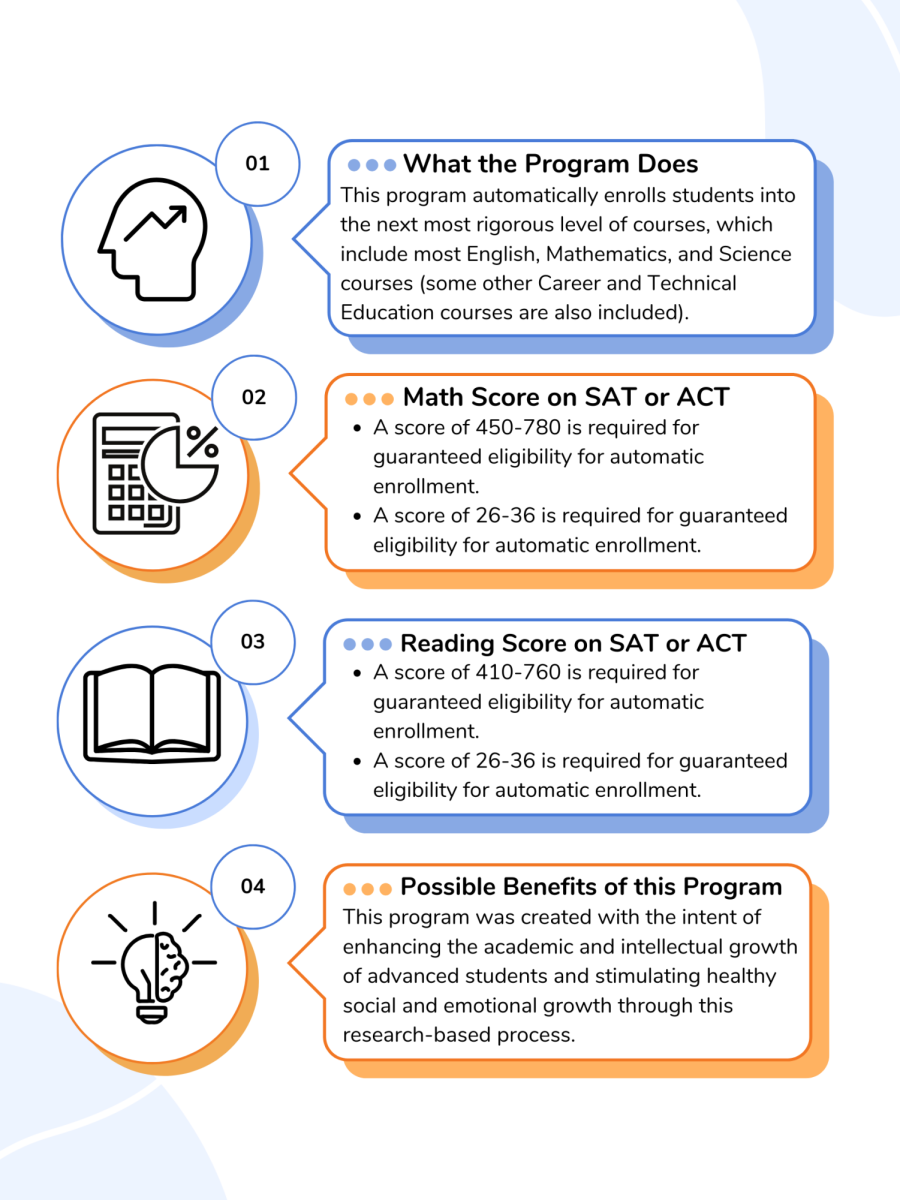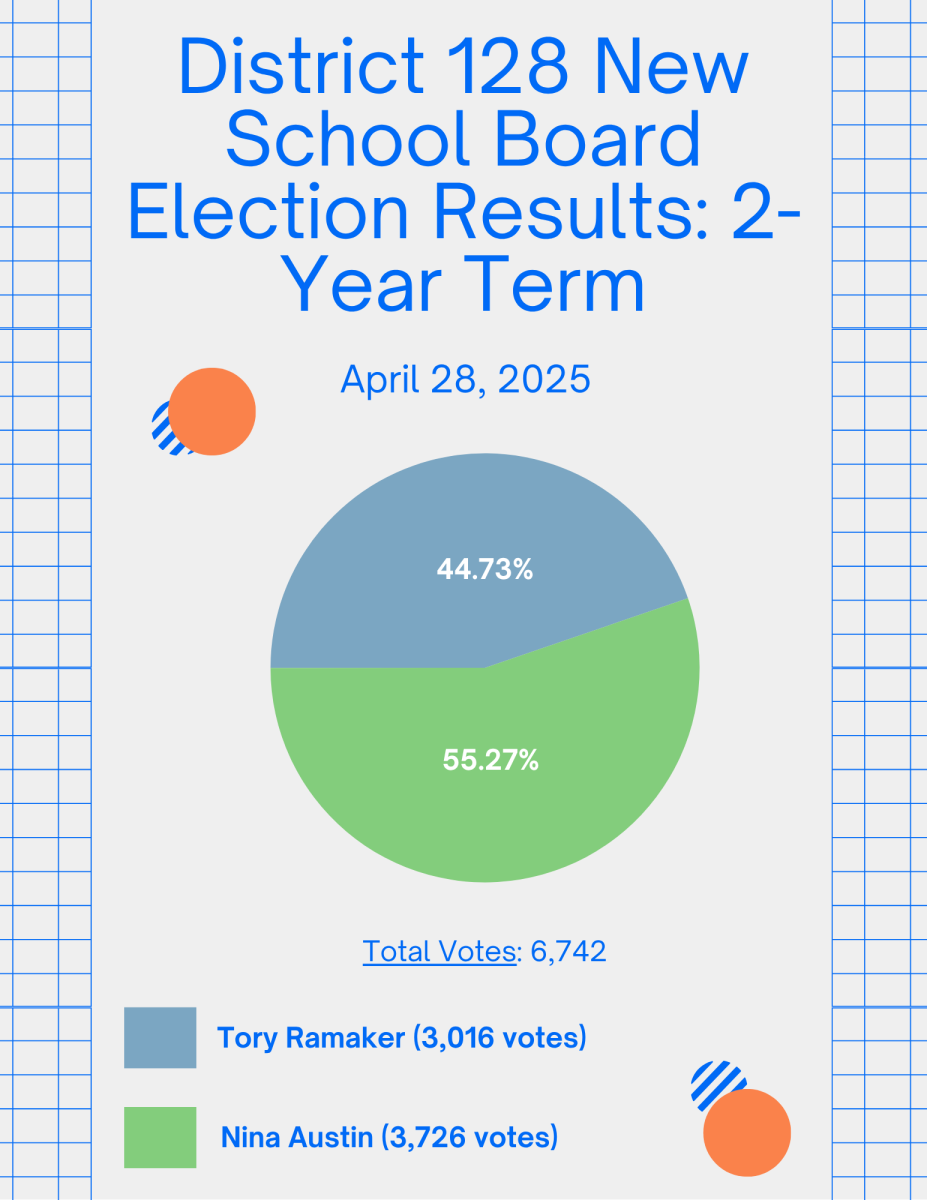According to the Illinois State Board of Education, the Accelerated Placement Act (APA) aims to “expand access to accelerated placement programs” and “ensure teaching capacity necessary to meet increased demand” starting in the 2023-2024 school year. This means high school students in Illinois will be automatically placed into the “next most rigorous level of coursework” based on meeting a certain test score for Math and English in their PSAT or SAT, depending on their grade level.
Course decisions
It is important for students to know that regardless of where they are automatically placed for their courses in the upcoming school year, they are able to go up or down a level.
“It’s ultimately their decision at the end of the day,” social studies teacher Mr. Wahl said. “They know their schedules, they know what they can handle.”
For some students, the APA may not be changing their decisions that much.
“I tend to take high-level courses [for] a lot of my [classes] anyway,” junior Ahan Dey said. “I do realize that for people who don’t necessarily do that, [the new law] definitely can be a pressuring thing to hear.”
But for some students, the APA can bring possibilities to the table that they hadn’t considered before.
“[The APA] will be good because it will have [students] realize they could be in a higher level class that they hadn’t thought of before because it’s tied to test scores of students who are good test takers,” English teacher Mr. Gluskin said. “Maybe [students will] see more potential in themselves or see an area that they could do well in.”
Whether or not students find potential in themselves to succeed in higher level courses, there are some uneasy feelings about taking classes that are out of their comfort zone. This is especially true since a lot of students at LHS take multiple higher level and AP courses.
“I think for some students, [the APA] may give them more confidence,” Mr. Gluskin said. “If [students are] going to take the higher level classes they’re recommended for, they should want to do that as well. And obviously not just blindly be doing it because you don’t want anyone to get in over their head or take on too much.”
Even if students feel that they will succeed in higher-level classes and generally want to take the classes without feeling an ample amount of pressure, there are still other factors outside of school – passions, interests, extracurriculars, etc. – that can play a role on their ultimate decision based off of their recommendations by the APA.
“My fear is that students won’t look at the whole picture,” Science teacher Ms. Rukes said. “My concern is 10 years from now when you look back at your college, your high school career. What are you going to remember? Are you going to remember feeling overwhelmed, burned out and just studying for tests? …I would want [students to have] time to explore, make memories [and] have fun. …I fear that the balance is not going to be there.”
Balance is an important factor to keep in mind when students figure out their classes, especially when students may be getting multiple honors and AP recommendations because of APA.
“I think they need to self-reflect,” Ms. Rukes said. “This is just one piece of the puzzle and [students need to] think about what else [they] have going on. And it doesn’t mean taking eight AP classes or eight honors classes… There are other things in the school that the school offers.”
Role of PSAT/SAT
For some students, standardized tests don’t fully capsure what they are capable of by taking the next level up in a class. There can be other determining factors that contribute to a student’s course placement.
“I know personally I would look at the whole person and I would see how their work ethic is,” Ms. Rukes said. “In an AP, like science class, I would look at math grades, I would ask them what they are thinking about doing stuff like that. I know not everyone is a test taker. And this placement is based on one test… I don’t think it tells the full picture.”
In some ways, these tests can be a guide for what material students actually know.
“I honestly think that [the PSAT and SAT are] both good levels of whether or not a student can [have] academic levels of success [in higher level classes],” Mr. Wahl said. “I think a lot of times grades can be so subjective, and an A for one teacher may not be an A for another teacher or school… And recently, a lot of colleges are going back to making students submit SAT and ACT scores, which I think is actually a really good thing because it gives a good benchmark for what students know as opposed to …a teacher giving [them] good grades just for handing in homework.”
While these tests can be a good benchmark for students and can show what they actually know, another thing to look at is if the information on there is actually relevant to what is being taught in these higher-level classes.
“All the math on there at least was like stuff that I learned in middle school,” junior Ava Traubenberg said. “There’s no calculus on there or anything like that. So I don’t see why something that’s testing like your basic knowledge of math, reading whatever should be determining your place in a calculus course or AP Lit course because that stuff isn’t tested on the SAT.”
The current system of course selection entails teachers recommending students for a certain course level based on their grades and their general classroom performance. The APA doesn’t take that into consideration.
“I like having the opinions of my teachers…because they probably know more about my own learning than I do,” sophomore Max Holland said. “They can take a step back and look at it on a broad scale. It helps me to decide, should I take the next class or should I just stay here?… Now this decision is all on me.”
Overall, the new Accelerated Placement Act can bring about mixed feelings among students and teachers. Unlike past years, students now have to decide on their own what course level they should take. It’s important to look at the overall picture and not just on what the PSAT and SAT recommend and not get sucked into feeling pressured.
“I always recommend [that] for students taking AP classes, take stuff you’re interested in,” Mr. Wahl said. “Just because you have the ability to do something and you can do it doesn’t mean you should take so many AP classes that you miss your lunch or have a full schedule and a really big workload. …It’s ultimately up to [students], but it’s kind of nice to see [that students] have the ability to [take these higher course levels] if I really want to.”





![Mr. Abullh Ali, manager/assistant, helps open Queen Yemeni Coffee in downtown Libertyville at 606 North Milwaukee Ave. With the help of employees such as manager and LHS senior Yousef Taha, they are able to bring the Yemeni and Ethiopian culture to Libertyville by using their Queen spices, cinnamon and cardamom in their drinks such as Adani Chai, which is inspired by Sheda, the Queen of Yemen and Ethiopia. “The history of our coffee [is] a long history and we believe that Yemen and Ethiopia started the coffee and we are bringing something unique to the community,” Mr. Ali said.](https://www.lhsdoi.com/wp-content/uploads/2025/04/Photo-1-1200x800.jpg)




